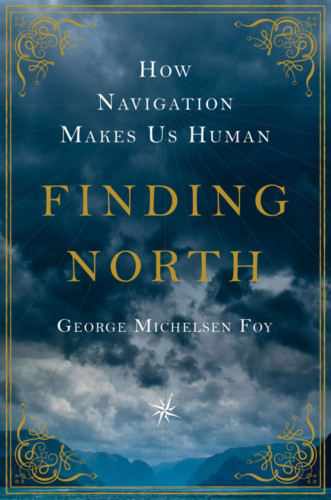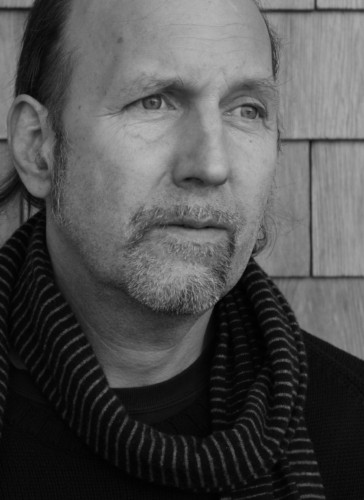George Michelsen Foy is the author of Zero Decibels: The Quest for Absolute Silence and twelve critically acclaimed novels. He was a recipient of a National Endowment of the Arts fellowship in fiction, and his articles, reviews, and stories have been published by Rolling Stone, The Boston Globe, Harper’s, The New York Times, and Men’s Journal, among other publications. He teaches creative writing at NYU and is married with two children. Foy divides his time between coastal Massachusetts and New York.
His most recent book Finding North: How Navigation Makes Us Human takes readers on a journey from the crowded and confusing streets of London to the still archaic ocean navigation of Haitian traders, all in search of the key to understanding how humans have found their way around the globe and where we may be able to go next.
 Whether going to the grocery store or setting out on a cross-country road trip there is nothing more important than navigation. It is a key human skill that some are able to instinctively grasp while others may have trouble finding where they parked their car. As humans we have honed our ability to navigate from our earliest days, whether by the direction of sun and stars or by using the GPS in our phones. To fulfill this quest, he set out on myriad voyages, visiting the home of a secret navigational cult in ancient Greece; undergoing the same training as London cab drivers; and sailing on a Haitian cargo sloop. Foy also traveled to Schriever Air Force Base in Colorado Springs, CO, control point of the Global Positioning System (GPS), to better understand how the technology millions of people use every day works.
Whether going to the grocery store or setting out on a cross-country road trip there is nothing more important than navigation. It is a key human skill that some are able to instinctively grasp while others may have trouble finding where they parked their car. As humans we have honed our ability to navigate from our earliest days, whether by the direction of sun and stars or by using the GPS in our phones. To fulfill this quest, he set out on myriad voyages, visiting the home of a secret navigational cult in ancient Greece; undergoing the same training as London cab drivers; and sailing on a Haitian cargo sloop. Foy also traveled to Schriever Air Force Base in Colorado Springs, CO, control point of the Global Positioning System (GPS), to better understand how the technology millions of people use every day works.
I was able to ask George about his new book, fatherhood, and more.
Art Eddy: Your book Finding North: How Navigation Makes Us Human came out earlier this year. I love the concept of you exploring how we have used navigation throughout time. What inspired you to write this book?
George Michelsen Foy: Originally it was my family’s obsession with the sea—my mom’s Norwegian family were all sea captains or fishermen. My father worked on French Line ocean liners, like the SS Normandie, and he used to take my brother and me to visit the liners when they docked in New York; seagoing palaces from another world. I was born on Cape Cod and started learning to sail, literally, before I could walk, and I became fascinated with navigation at an early age—later I became a commercial fisherman, and an officer on British tramp freighters, and used the skill professionally. I always loved history, as well, and was interested in how the ancient Greeks, Vikings and Pacific Islanders found their way using only sun, stars and knowledge of the sea.
The immediate inspiration for the book, though, came from an incident on land, when I woke up completely disoriented after sleeping by the side of the road during a late-night drive, and started wondering why that scared me so much, and why knowing direction was so important to us.
AE: Now with GPS devices in our phones we no longer need to use maps. We take technology for granted in that sense. With the research that you did for this book what are some of the pitfalls of relying on technology?
GMF: There are clear physical dangers. The part of our brain that navigates (the hippocampus and associated organs) is the same part that controls memory. Our memories are who we are, and we navigate them just as we navigate a new city. Experiments show that if we passively take direction from devices—GPS for example—the navigation/memory part of our brain starts to deteriorate, basically from lack of exercise. That deterioration can lead to increased risk of contracting diseases of memory: dementia, Alzheimer’s. Those diseases are on the rise at the same time as we give up navigating for ourselves, and I don’t think that’s a coincidence.
But there’s a more subtle danger. The fact that our navigation and memory centers are one and the same suggests that finding our way around, which includes remembering landmarks, was the primordial skill through which the human brain developed, and how we attained consciousness. If there’s one thing we as humans are good at, it’s consciously venturing forth into the unknown and figuring out where we are, and how this new place works. Yet more and more we are giving up using our navigation / memory skills to GPS, Google, and other information technologies. At a time when the world is in increasing danger from various quarters—global warming, droughts, refugee crises, wars, population increase—we should be looking around us more, actively venturing forth both intellectually and physically, trying to understand and solve these problems—not letting machines tell us where we are, where to go, and what factoids are “trending” on Facebook.
AE: Your great-great grandfather was a captain of a Norwegian cargo ships. He got lost at sea in 1844. I read that you re-created the trip. What was that experience like for you? What did your family think of you taking that trip?
GMF: Thinking about the trip scared me, because I had only a small sailing boat, not a ship, and I wanted to do a trip like my ancestor did, well offshore, using only old-fashioned tools like compass and sextant. I didn’t have radio and didn’t want to use GPS. I also didn’t want to sink and drown like great-great-grandpa did. I brushed up my skills with the sextant (which measures how high the sun and stars are, giving you an altitude that allows you to figure out where you are on the planet). The trip was from Cape Cod to Maine.
When I actually started sailing I stopped being scared, even though the wind got very strong and the weather got bad for a while, and then turned to fog. The fog wasn’t fun. But it was fun being far away from land, just me and a friend who was my crew and the boat and stars and birds and whales … I didn’t tell my family how nervous I was, or how I was having nightmares about not coming back and leaving them to cope without me, but I think they figured it out, and they told me to be careful, and to call as soon I got to safe harbor.
AE: What do you hope readers will take away from this book?
GMF: First I want them to enjoy the story, which is exciting in many ways, since it’s about a search, for my ancestor’s wrecked ship, for the secret behind his shipwreck, and also a search to understand how animals are so much better at navigating than we are, and how we can figure out where rockets go in space—for example.
Second, I’d like readers to understand how crucial it is to always be navigating—on sea and land, of course, but also in how we think; because navigation is really like exploration, it means going into unknown territory (which means to some extent getting lost) and figuring out how that space works and where we are in it and how to get back home. To do that we need to reserve time when we are not passively accepting information, when we’re not being told where we are by all the tremendous but passivity-inducing resources of the Internet.
AE: What was the most interesting thing you learned while writing this book about navigation? 
GMF: That we navigate memory, language and even emotions with the same part of the brain—and that we can figure out our lives, and discover things, like explorers, using different kinds of mental maps.
AE: Switching to fatherhood now what are some of the core values you instilled into your kids as they were growing up?
GMF: I hope I taught them to be, in this order: To be kind, curious, honest, and adventurous.
AE: What books would you read to your kids when they were growing up?
GMF: The Wind in the Willows, Mystery on the Docks, Time of Wonder, Blueberries for Sal, all the Margaret Wise Brown books (Mister Dog, Scuppers the Sea Dog, The Color Kittens), the Adventures of Tintin, Le Petit Nicolas
AE: What advice do you have for new dads out there?
GMF: None of this is new or original but it’s true: Take time to enjoy your kids, read to them, and go to a playground with them, play games with them, nothing is more important and they grow up so darned fast. Don’t be afraid to set firm limits that they can’t argue with, kids need those limits and they need parents who stick to ‘em.
Life of Dad Quick Five
AE: What is your favorite family movie?
GMF: Kiki’s Delivery Service (a wonderful Japanese animated film by Hiyao Miyazaki)
AE: What is your favorite song to dance to as a family?
GMF: Skip around in a circle, from the Sesame Street exercise album, sung by Big Bird.
AE: Describe the perfect family vacation.
A week in a house in coastal Maine or Liguria with good hiking, good swiming, good food, good books, good art materials and absolutely no Wi-Fi, cellphone coverage, video capability or TV reception of any kind.
AE: What was your favorite book growing up as a kid?
GMF: Smuggler’s Luck, by Edward Stackpole, a tale of Nantucket during the American Revolution
AE: Was there an author that inspired you to become a writer?
GMF: Farley Mowat, a great Canadian writer; he wrote about wolves, and whales, and Vikings, and also wrote children’s books like The Black Joke. I wrote him a letter once, to his address in Newfoundland, telling him I wanted to be a writer and live like him in the forests of Newfoundland, and he wrote me a long, encouraging letter back—with the added comment that there were no trees at all in his part of Newfoundland.
You can purchase Foy’s book, Finding North: How Navigation Makes Us Human HERE!
